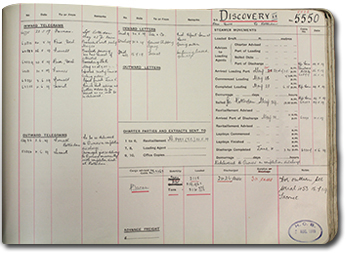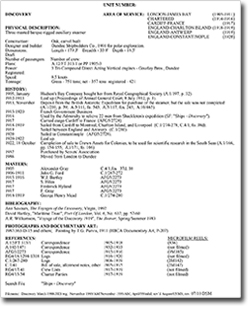The 100th anniversary of the First World War is now finished but the records will continue to be preserved at the Archives and accessible to current and future generations who want to know more about the time period. In addition, this blog will remain on our website as an additional resource.
November 2015 Posts:
- 30 November: Discovering the Discovery
- 23 November: HBCA Search Tools – Ships Histories
- 16 November: Nellie McClung “…that greatest of all Western women…”
- 9 November: Remembering the First World War at the Archives of Manitoba
- 2 November: The First World War in Letters: A Public Event at the Archives
30 November 2015
Discovering the Discovery
During the First World War and after, HBC's polar explorer, the Discovery, joined HBC's fleet of hundreds of ships to carry out its business as purchaser and transporter of supplies to and from Allied governments. It had originally been built to plough through ice-laden waters in the Arctic but during the war, it served a very different purpose.
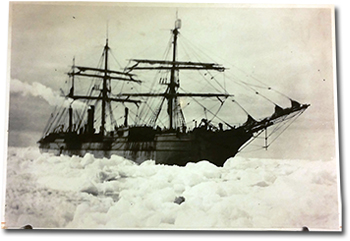
Hudson's Bay Company Archives, Archives of Manitoba.
Hudson's Bay House Library photograph collection subject files,
Photo of Discovery, 1987/363-D-15-4.
Here is an example of a “steamer movements” record from the holdings of the Hudson’s Bay Company Archives. The record documents a voyage of the Discovery to Rotterdam, the Netherlands, in Spring of 1919. Listed under cargo is… bacon! 2426 cases to be exact.
Excerpted page from the Hudson's Bay Company Archives, Archives of Manitoba,
Movements Department voyage record, C-D, 1918-1921, HBCA RG22/11/4.
Search Tip: Use keyword “Discovery” in Keystone to see descriptions of records about the ship and come to the Archives of Manitoba Research Room to access HBCA ships history information sheets.
Feedback (0)
E-mail us at [email protected] with a comment about this blog post. Your comments may be included on this page.
23 November 2015
HBCA Search Tools – Ships Histories
We have a variety of “search tools” at the Archives of Manitoba to help you find records and information, including records related to Hudson’s Bay Company ships. Ships’ histories were created by archives staff many years ago. They provide a brief overview of the ship, including a physical description, history, area of service, years of operation and names of masters. They also provide a snapshot of some (but not all) related records in our holdings.
The example below is a ships history for the three-masted steamer Discovery. Originally designed to withstand the rigors of polar exploration, the Discovery also came to have a unique and colourful history. During the First World War, the ship joined HBC’s merchant fleet and served overseas, transporting goods and supplies to Allied governments. It would later participate in Shackleton’s famed expedition and be used for scientific research in the South Seas.
Records in our holdings which document the Discovery’s service to HBC include ship logs, crew lists, correspondence, photographs and more.
Search Tip: Use keyword “Discovery” in Keystone to see descriptions of records about the ship and come to the Archives of Manitoba Research Room to access HBCA ships’ histories.
Feedback (0)
E-mail us at [email protected] with a comment about this blog post. Your comments may be included on this page.
16 November 2015
Nellie McClung “…that greatest of all Western women…”
It is notable that at the same time that war was raging on the Western Front, women in Manitoba were campaigning for the right to vote. Here at the Archives, we wondered what soldiers might have thought about the suffrage movement, so we had a look at soldiers’ personal letters written in December 1915 and early 1916. We didn’t find any specific reference to women winning the vote in 1916, but we did find two different soldiers’ letters in which Nellie McClung was mentioned. This is perhaps a testament to the profile of both McClung and the women’s suffrage movement in Manitoba at the time.
In a letter dated 13 January 1916 to his friend Edna Chapman, Dick Richardson wrote that he had heard that “one of Mrs. Nellie McClung’s sons” would soon be shipped to England as part of the 5th Universities Company. (This is also a reminder of how inter-connected the events of the day were: suffragists were also sending their sons to war.)
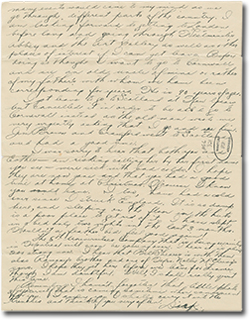
Archives of Manitoba, Edna M. Chapman Robson fonds,
Letter from Dick Richardson to Edna Chapman, January 12, 1916, P6011A/2.
Meanwhile, stationed at Bramshott Camp in England, in a 30 December 1915 letter to his sister, Edgar Russenholt wrote glowingly of both Nellie McClung and his sister:
“Your [sic] working too hard. As for your life being useless to anyone I think you are right now doing one of the greatest works possible for any person – on a par with Mrs. McClung. I mean it. I’ve never seen or heard that greatest of all Western women, but I am convinced that my sister is possessed of equal ability, every time.”
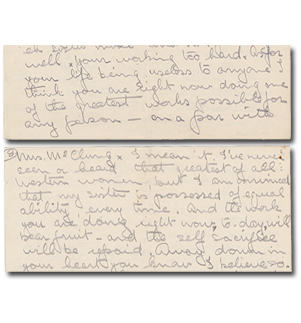
excerpt from pages 7-8
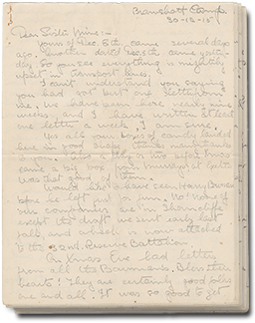
entire letter (10 images)
Archives of Manitoba, Edgar S. Russenholt fonds, Edgar Russenholt correspondence, 1915, P2828/3.
Search Tip: Search “Edna M. Chapman Robson fonds” or “Edgar S. Russenholt fonds” in Keystone for more information about these two collections. All of the letters (written by Dick Richardson) in the Edna M. Chapman Robson fonds have been digitized and can be read through Keystone.
Feedback (0)
E-mail us at [email protected] with a comment about this blog post. Your comments may be included on this page.
9 November 2015
Remembering the First World War at the Archives of Manitoba
The Archives continues its efforts to highlight records created during the time of the First World War, 1914-1918. Leading up to this Remembrance Day, we invite you to you learn more about the war and those who were involved.
- Search our index. The Archives of Manitoba has created an electronic index of 1092 of the Manitoba soldiers killed in the First World War. This index was generated from a series of index cards created by the Government of Manitoba for the purpose of documenting Manitoba casualties of the First World War. The original index was made during and after the war but was not a complete record. As a result, this electronic index is also not a complete list of Manitobans killed in the First World War. (Read our June 29 blog for more about the index.)
- Read some letters. The Archives has digitized 3 collections of letters from First World War soldiers. Search Keystone for the Battershill family fonds, the Jack Winter Quelch fonds and the Edna Chapman Robson fonds and click “digital copies” to find the letters. (Read our July 13 blog for more details.)
- Attend our public reading. We are hosting an event on Tuesday, November 10 at 7 pm in the Archives Research Room. On the eve of Remembrance Day, we will feature readings from original letters written by Manitoban soldiers who served in the First World War. These letters are from the collections of the Archives of Manitoba.
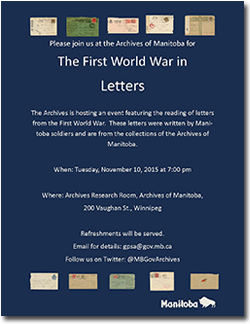
The First World War in Letters: A reading of letters from Manitoba soldiers
Poster reads:
Please join us at the Archives of Manitoba for The First World War in Letters. The Archives is hosting an event featuring the reading of letters from the First World War. These letters were written by Manitoba soldiers and are from the collections of the Archives of Manitoba.
When: Tuesday, November 10, 2015 at 7:00 pm.
Where: Archives Research Room, Archives of Manitoba, 200 Vaughan Street, Winnipeg
Refreshments will be served.
Email for details: [email protected]. Follow us on Twitter: @MBGovArchives
Feedback (0)
E-mail us at [email protected] with a comment about this blog post. Your comments may be included on this page.
2 November 2015
The First World War in Letters: A Public Event at the Archives
“I cannot think of anything to write about that does not in one way or another swing round to the great sorrowful war. There is not a gleam of hope in sight but perhaps we have walked so long in darkness that we have ceased to look for the dawn.”
Frank Leathers, November 29, 1917 (Archives of Manitoba, Frank Leathers fonds, P2992/7)
Please join us at the Archives for a public event on November 10, 2015 at 7 pm in the Archives Research Room! On the eve of Remembrance Day, we will feature readings from original letters written by Manitoban soldiers who served in the First World War. These letters are from the collections of the Archives of Manitoba.

The First World War in Letters: A reading of letters from Manitoba soldiers
Poster reads:
Please join us at the Archives of Manitoba for The First World War in Letters. The Archives is hosting an event featuring the reading of letters from the First World War. These letters were written by Manitoba soldiers and are from the collections of the Archives of Manitoba.
When: Tuesday, November 10, 2015 at 7:00 pm.
Where: Archives Research Room, Archives of Manitoba, 200 Vaughan Street, Winnipeg
Refreshments will be served.
Email for details: [email protected]. Follow us on Twitter: @MBGovArchives
During the war, letters sent to and from the front were the main form of communication between soldiers and their families and friends back home. Soldiers wrote letters from the trenches, from hospital beds and from training barracks. They wrote to mothers and fathers, sisters and brothers, friends and sweethearts.
Many collections of letters from the First World War have been donated to the Archives of Manitoba. These letters are a powerful record of individual soldiers, recording their thoughts and feelings during the war.
Feedback (0)
E-mail us at [email protected] with a comment about this blog post. Your comments may be included on this page.



